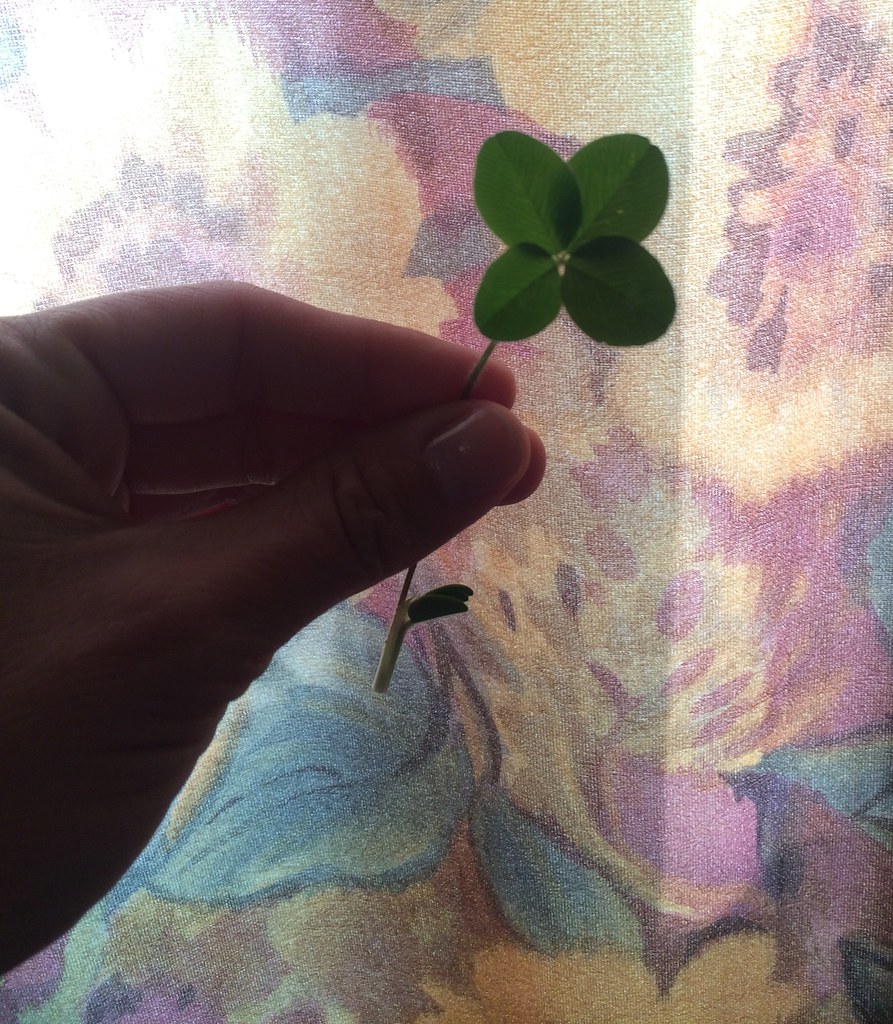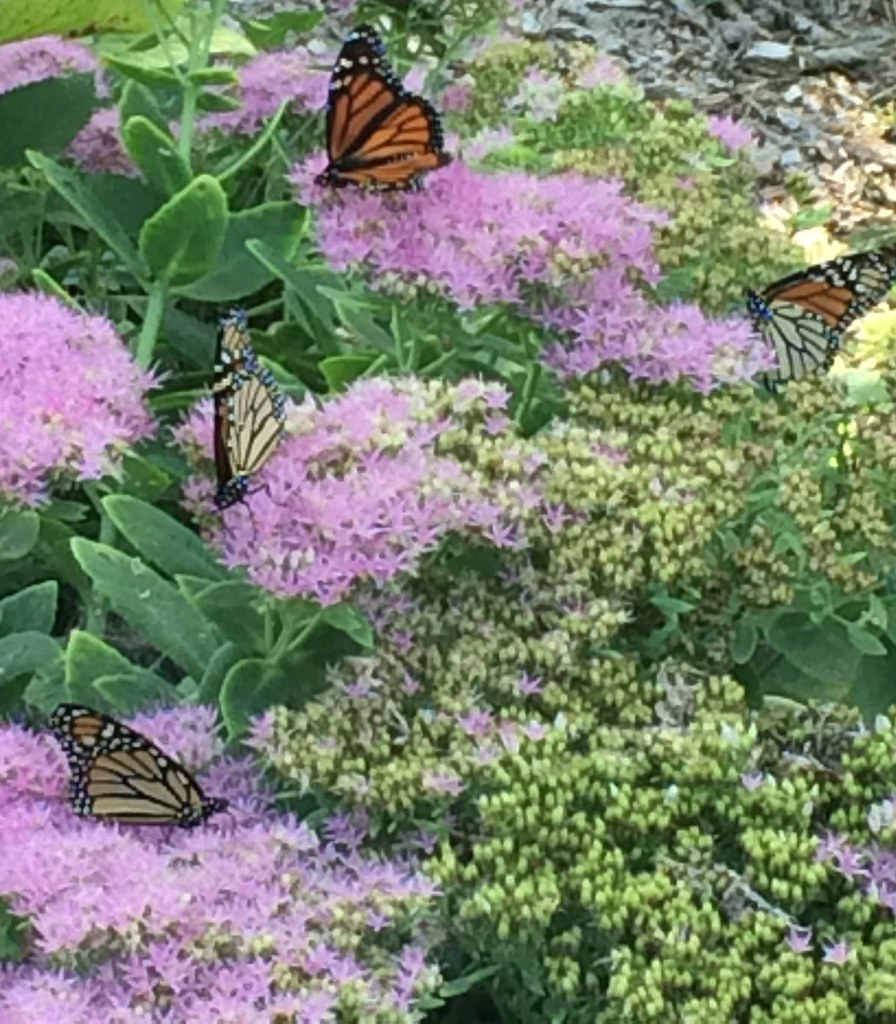 I’d like to say my usual good morning, good morning, but it’s taken me all day to get to this post. Refinding my way into my writing after a long break can go like this. Bear with me, ok?
I’d like to say my usual good morning, good morning, but it’s taken me all day to get to this post. Refinding my way into my writing after a long break can go like this. Bear with me, ok?
As the light shifts and we find ourselves fully into autumn (whether it feels like it or not where you are), I hope this finds you brimming with words and readying to write. I certainly know I am.
This month’s newsletter comes to you with 4-leaf clovers and migrating monarchs – see below!) out of the midwest. I found the gift up there the day before I was to give a presentation at the Power of Words conference about self-care for transformative language artists (that is, anyone who uses language in a healing or transformative way: writers, poets, workshop facilitators, storytellers, songwriters, therapists, teachers, and so on). I needed a little good luck…I had arrived at the conference (at Lake Doniphan, just outside of Kansas City) quite depleted after a month full of family, workshops, and preparations to finally complete our new book, Sex Still Spoken here: the Erotic Reading Circle Anthology. The further I got into the month, the more self-care practices dropped away: I stopped running, ate poorly, spent no time in the garden, and even told myself that I didn’t have time or energy to write in the mornings. Despite the fact that that last is always a flashing neon red flag, announcing loudly that I need to make some changes (I am not much fun to be around when I’m not writing regularly), still I kept going, kept doing more, kept depleting myself further. I began to feel like the bottom of a used cookpot — burnt and scoured, and still I kept on scraping at the remnants, expecting to be able to nourish myself and others on charred tailings rather than taking the time to step back, slow down, and replenish.
Do you have months like this? Years like this, maybe?
Now here I was at a conference of my transformative language arts peers, and I barely had any energy to connect with the beautiful, brilliant folks around me. How could I present a talk/workshop about self-care when I had been doing such a poor job of taking care of myself?
 After taking some time to get quiet with the natural world (thank you, monarchs and cicadas), I walked into my workshop with my whole self — I told the gathered participants exactly where I was coming from, and honored how very difficult it can be to take care of ourselves, even when we are working to help others take care of themselves. I described my own experiences of burnout and how I sometimes had to get clear to rock bottom before I believed I deserved to take care of this instrument that is myself. I described how grateful I felt in 2008 when I discovered Laura van Dernoot Lipsky’s Trauma Stewardship book and program — and how called out I was by her assertion that we who called ourselves trauma stewards could not possibly do ethical (not to mention sustainable!) work with others if we were not also taking care of ourselves. That one hit home in a big way for me, and yet I am still struggling, six years later, to believe that I am worth taking care of.
After taking some time to get quiet with the natural world (thank you, monarchs and cicadas), I walked into my workshop with my whole self — I told the gathered participants exactly where I was coming from, and honored how very difficult it can be to take care of ourselves, even when we are working to help others take care of themselves. I described my own experiences of burnout and how I sometimes had to get clear to rock bottom before I believed I deserved to take care of this instrument that is myself. I described how grateful I felt in 2008 when I discovered Laura van Dernoot Lipsky’s Trauma Stewardship book and program — and how called out I was by her assertion that we who called ourselves trauma stewards could not possibly do ethical (not to mention sustainable!) work with others if we were not also taking care of ourselves. That one hit home in a big way for me, and yet I am still struggling, six years later, to believe that I am worth taking care of.
We are so many of us trained, early and often, to take care of everyone else before we take care of ourselves. Those lessons are repeated continuously: There is so much need, so much trauma, so many around us who need help. Who do we think we are to take time out of our social change efforts to “replenish the well” (as Julia Cameron says in The Artist’s Way)? I don’t know about you, but when I’m not taking care of myself, I get into this mindset that says, “If I just do these last few things for them, then I’ll be able to take some time for me.” The trouble is, there’s no end to what I (tell myself I) need to do for other people. There’s no way to finish that to-do list, and I drive myself into the ground trying to “get it all done.”
There’s no such thing as getting it all done — especially not when we’re talking about trauma and its aftermath.
I have to change the paradigm, and put self-care right up at the top of every day’s tasks. This is difficult work, especially when I’ve already slipped back into my codependent-hero costume (complete with Wonder Woman cape, thank you): I am putting everyone else first! Look at how great I am! Never mind that after not very long I’m going to disappear under a rock and quit responding to email messages and phone calls because I’m so overwhelmed — the pendulum swings over to the selfish-shame side of things.
Have you been on this ride? The Wonder Woman side feels great for a little while, but the crash is kind of a drag.
In A Feminist Ethic of Risk, Sharon Welch reminds her readers that we can’t approach social change work with the sort of individualist mindset that many of us (especially white middle class Americans) are trained into — not only must we work in community and collaboration, we must prepare ourselves for small victories and do our work in such a way that we are building a scaffolding for those who will come after us — who will pick up our work after we have gone. If we expect to get it all done today (To do list: buy dish detergent, get flea medicine for cat, take out trash, end rape culture) even in our lifetimes, we are sure to burn out. We have to slow down, breathe deep, work steady and consistently, and remember that we are not alone in our struggles.
I forget this a lot. As a survivor who was, like so many, intensely isolated — and also as an introvert who needs time to myself to process and replenish — I tend to do a lot of my work alone. I live in a community that is both wildly creative and also frantically busy and consistently overwhelmed; we are all trying to figure out how to do our art, create change in collaboration with others, and also pay our rent. I, like so many cultural workers in the Bay Area, find myself taking on too much, trying to Do It All, before depleting my resources and needing to retreat into a bit of quiet until I feel a tiny trickle of water start to flow into the parched desert of my creative soul. Then I dive back into work again full bore, expecting that trickle to do the work of the sea. Working from a place of overwhelm is like having blinders on — all I can see is the road ahead. I forget why I’m doing what I’m doing. I forget why I loved this work. I stop being able to see the impact of my efforts, and begin to despair — why am I working so hard when nothing ever seems to change? What good is this work, anyway? Am I really making any sort of difference?
I showed up at the conference deeply depleted. Thankfully, The Power of Words conference is a space that values authentic presence, and I was able to show up exactly as I was. I talked a little bit about the need for transformative language arts workers to take care of our good and necessary selves, and then we broke into small groups and folks wrote together (this was our prompt) and held one another’s words. It was a gorgeous group of writers, and I found myself — even from the edge of despair on which I was teetering — grateful all over again for what happens when folks write openly and honestly, then share their words with each other and allow themselves to be received with kindness and generosity.
Then I went to Arby’s and got potato cakes by way of celebration — hey, I was home, and only wanted to eat the things my 10 year old self would have wanted to eat.
Since getting back from the conference, I helped launch a book into the world and celebrated its authors, have two new survivors groups beginning, and am preparing for Writing Ourselves Whole’s inaugural reading at San Francisco’s Lit Crawl. I am also slowing down, not making plans, leaving hours open for daydreaming and reading. The more space I have, the more the words begin to return — and the more able I feel to sit down with them and let them flow onto the page.
Self-care is a difficult practice for any of us, and trauma survivors have our own challenges. I have to remind myself over and over again of Audre Lorde’s words: “Caring for myself is not self-indulgence, it is self-preservation, and that is an act of political warfare.”
We deserve to preserve ourselves. We deserve to be in our chosen work for the long haul. We deserve to be well inside our skins. I say it to you in order to remind myself as much as to remind you. Thank you for all the ways you are tender with your psyche, body, and soul. Thank you for your spaciousness with others when they are needing to retreat in order to take care of themselves. And, as ever, thank you for your words.

3 responses to “the difficult and beautiful struggle around self care”